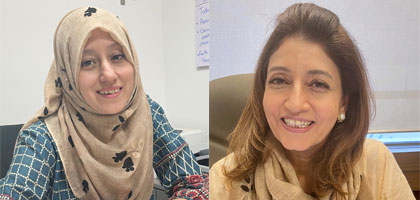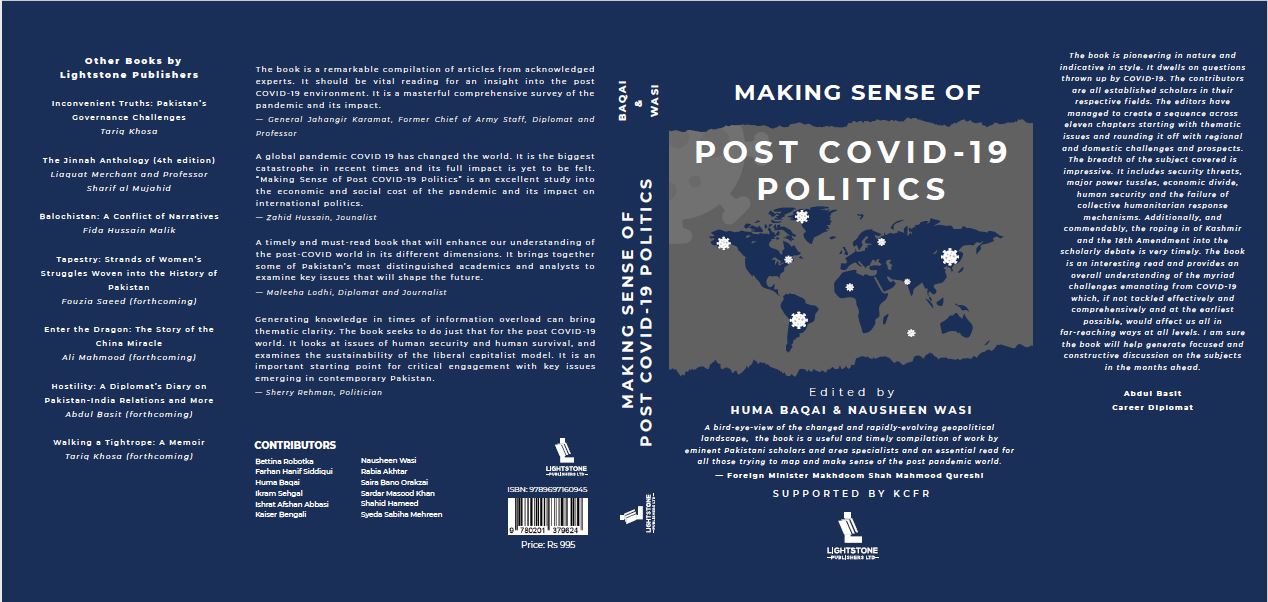Faculty Achievement View More Faculty Achievements

Research Publication
IBA faculty and staff co-author paper that explains the modern South Asian integration process
Dr. Huma Baqai, Associate Professor – Social Sciences, IBA Karachi, along with her colleague Syeda Sabiha Mehreen, Research Assistant, IBA Karachi have recently had their research paper titled, "Twenty-First Century Regionalism: Impact on South Asia", published in Pakistan Study Centre's bi-yearly journal, Pakistan Perspectives (Vol. 25, #2, July – December 2020).
The full paper is accessible at: https://papers.ssrn.com/sol3/papers.cfm?abstract_id=3793495
Abstract:
The paper is an attempt to review twenty-first century regionalism and its impact on South Asia, which includes the rising role of China and Pakistan's pivot status as contributing factors to peace, growth, and development. This coincides with a more south-oriented world. The theory applied is NeoFunctionalism, which explains the European integration and may be used to explain the potential modern South Asian integration process with China as a pre-cursor. This will perhaps be a positive outcome of the twenty-first century regionalism. The paper dwells upon intra-regional integration, sighting Eurasian model of connectivity as an example, and how it can be a role-model for developing countries. The emphasis remains on improved relations between Pakistan and India as a pre-requisite for regionalism to take off in South Asia.
Recognition
IBA faculty appointed as Visiting Senior Fellow at PIDE
The IBA Karachi is pleased to announce that Dr. Huma Baqai, Associate Professor – Social Sciences, IBA Karachi, has been appointed as Visiting Senior Fellow at the Pakistan Institute of Development Economics (PIDE).
In her new role, Dr. Baqai will interact with researchers and faculty members and share her profound knowledge and experience. She will mentor students in their course work and research, while assisting in proposal development to solicit funding from various donors. Complementing these academic efforts, Dr. Baqai will assist PIDE with outreach activities, guide their research agenda and will utilize her diverse experience to build Pakistan's thinking community.
The IBA Karachi wishes Dr. Baqai all the best in this endeavor!
Research Publication
IBA faculty publishes paper on effects of demographic movements in Karachi
Dr. Huma Baqai, Associate Professor – Social Sciences, IBA Karachi, along with her colleague Dr. Mehtab S. Karim, Vice Chancellor and Executive Director, Centre for Studies in Population and Health, Malir University of Science and Technology, have recently had their research paper titled, "Migration and its Impact on Political Scenario: The Case of Karachi", published in Vol 3(2) of the Pakistan Journal of International Affairs. It is accessible at:
http://www.pjia.com.pk/index.php/pjia/article/view/77/57
Abstract:
The impact of population growth is felt on every wake of life. The movement of population from one country to another or within a country has its own consequences. Goldstone et al (2012) have thus argued, that the world's population is changing in ways that are historically unprecedented, having its own political consequences such as, the performance of the government due to increasing demand for services and the distribution of political power at intra-state level. Thus, internal migration, which is from high fertility rural zones to urban centers – in developing countries like Pakistan - in search of livelihood and employment, results in concentration of population in slums and squatter settlements on the one hand and a youth bulge in urban areas, further contributing to this phenomenon and unprecedented urbanization. State's inability to address this demographic change effectively results in strained resources and poor governance. In turn, it creates xenophobia, where native populations blame the new migrants for deteriorating civic amenities; and generates various conflicts of critical nature. Pakistan, since its inception as an independent country, has experienced both international and internal migration that resulted in socio-economic crisis, political agitation and violent ethnic conflicts. In this backdrop, this paper takes into account the migration patterns in Pakistan since 1947 and focuses on Karachi for it being the most affected city. It theorizes that the conflict matrix of Karachi is fairly indicative of fault lines and argues that these fault lines will turn into gaping holes if timely actions are not taken.
The book, Making Sense of Post COVID-19 Politics, is an attempt to answer the questions thrown up by COVID-19. It is a co-edited book by Dr. Huma Baqai and Dr. Nausheen Wasi, who is a faculty at Department of International Relations, University of Karachi, and a visiting faculty SSLA at IBA Karachi; they are also contributors. Ms. Sabiha Mehreen, Co-Researcher with Dr. Huma Baqai, is also a contributor. All twelve contributors are established scholars in their respective fields. The book has been published by Ameena Saiyid, CEO Lightstone Publishers and is supported by Karachi Council for Foreign Relations (KCFR).
The book dwells on three powerful shifts: 1) from state security to human security; 2) from greed-driven capitalism to conscience-laced capitalism; and 3) from US-Euro centric global politics to an Asia-centric order. This book brings together some of the best minds in Pakistan to make sense of chaos and confusion and initiate scholarly debates on different aspect of COVID-19 led changes. It identifies potential security threats, challenges to the existing ideological politico-economic divide, issues of human security and response mechanisms, and two very central issues of Kashmir and the 18th amendment.

